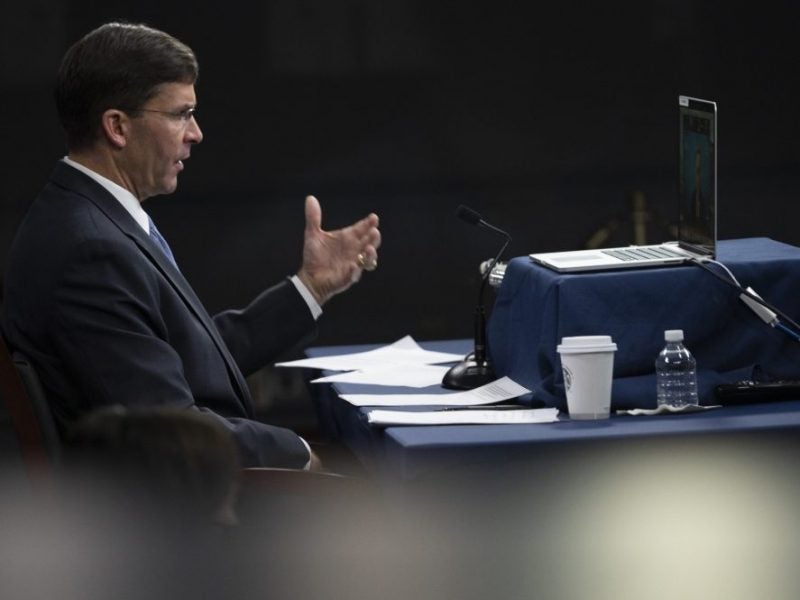
During the presentation, Esper discussed the various ways the US military is planning and continuing to deliver on its Indo-Pacific strategy, including what he referred to as the ‘three pillars’, the coronavirus pandemic, the threat of China and the development of military technology.
The three pillars
Esper identified the three pillars of the US Indo-Pacific strategy as preparedness, strengthening partnerships and promoting a more networked region.

Discover B2B Marketing That Performs
Combine business intelligence and editorial excellence to reach engaged professionals across 36 leading media platforms.
On preparedness, Esper said: “We are divesting from legacy systems and focussing on modernising our force and strengthening deterrents as demonstrated by our largest research and development budget in the department’s history.”
IISS research fellow for Chinese defence policy and military modernisation Meia Nouwens said during post-event analysis that Esper’s focus on partnerships sought to convince and reassure Indo-Pacific allies that the US remains fully committed to the Indo-Pacific as its priority theatre and that the US remains a reliable partner. He reinforced this by saying he had spoken with the defence secretaries of New Zealand and Korea “just yesterday”.
Esper said the Trump administration “looks forward to working with the United States Congress to establish a Pacific Deterrence Initiative that will prioritise our investments, maintain a credible deterrent and demonstrate an enduring government commitment to the region.”
China as a threat to the international order?
Esper said the “devastating worldwide impact” of the Covid-19 coronavirus pandemic reinforced the necessity of the international rules based order, saying: “In this era of globalisation the antidote to a viral contagion is communication and collaboration not disinformation and deception”.

US Tariffs are shifting - will you react or anticipate?
Don’t let policy changes catch you off guard. Stay proactive with real-time data and expert analysis.
By GlobalDataIISS senior fellow for Asia-Pacific security Lynn Kuok wrote in a recent blog entry: “The coronavirus will accelerate rather than derail prevailing trends in the region”. She added that other factors at play in the region would remain, in particular the US’s “ability to frame the contest as one that is not about containing China but supporting a free and open Indo-Pacific; this makes it easier for allies and partners to sign up to a joint vision.”
Esper said China was a threat to the value-based international order, adding that the Chinese Communist Party (CCP) continues to engage in systematic rule-breaking, coercion and other malign activities in this time of pandemic.
In particular, Esper pinpointed the East and South China seas as an area of tension within the region due to China’s repeated “aggressive behaviour”. China’s territorial expansion activities in the area affect numerous trading nations and neighbours, such as Vietnam, Malaysia and Indonesia. Esper outlined the US’s role as to “strengthen partnerships in the South region so that South-East Asian countries can maintain and defend their own waters.
“Most recently, Beijing advanced national security legislation that violates its commitment to the Hong Kong people to enjoy a high degree of autonomy. Calling the 1984 Sino-British joint declaration a statement of policies rather than the treaty that it is.”
Esper stressed the importance of China adhering to the US’s vision of respect for the sovereignty of others and adherence to the rule of law in international norms that China and the Chinese people have benefited greatly from over the years.
Military concerns in the region
Esper said that the US military is developing a new doctrine for the 21st century to coincide with the intensifying multilateral relations between the US and countries of the Indo-Pacific, both allies and adversaries.
“While we hope the CCP will change its ways, we must be prepared for the alternative”, he said.
Esper highlighted the incentive the development of military technology presents for Indo-Pacific region has in, saying: “We’re not only prioritising the development and deployment of game-changing technologies such as hypersonic weapons, 5G and artificial intelligence but we are also investing in platforms critical to the Indo-Pacific and transforming the way we fight.”
He reiterated the perceived threat China poses in technology development, saying: “5G is a game-changer not just for security relationships but also for prosperity and tech dominance […] that is why we believe Huawei is supported, influenced, resourced by the government in China, and why we have great concerns about Huawei.”
Esper concluded by saying: “China is a country with a storied history, rich culture and a wonderful people […] I hope to visit the PRC for the first time as Secretary in order to enhance cooperation on areas of common interest, establish the systems necessary for crisis communications and reinforce our intentions to openly compete in the international system in which we all belong.”
By Isla MacRae





